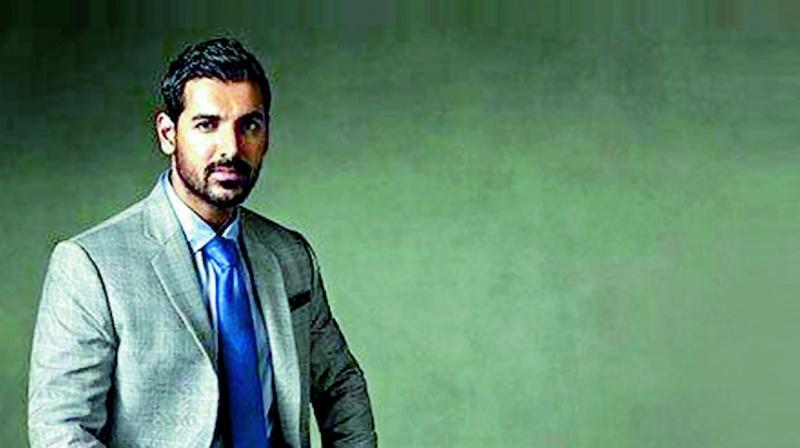Film Industry Is not secular: John Abraham
In a freewheeling chat, John talks about his daring choices as a producer, an actor’s social responsibility & his possible future in politics.

Seventeen years ago, when John Abraham first starred in Jism, his long auburn tresses were subjects of much fascination. Today, some 40 films later, the actor appears to have created the same furore, not because of his sporty crew cut, but because of his performance in his latest outing Batla House.
Over the years, John has risen from the ranks, proving his mettle in varied genres, be it comedies like Housefull, Dostana or Garam Masala, action flicks like Force, Dishoom or Madras Café, and dramas like Water, No Smoking or New York. However, lately, he has expanded his filmography to include movies that talk about some of the major developments in the country. From retelling the story of country’s first nuclear bomb testing in Parmanu: The Story of Pokhran, to exploring the black, white and greys of an encounter case in Batla House, John is becoming more daring with his choice of subjects.
In fact, not only Batla House, based on the 2008 Batla House encounter case, went on to be a success at the box office, critics are deeming his portrayal of a cop named Sanjay Kumar Yadav as his best performance. Naturally, we caught up with the actor about the film’s sweeping success, an actor’s social responsibility, and his own political aspirations.
What do you think of the audience’s positive response to Batla House?
I’ve never seen such a huge wave of appreciation from the audience in my entire career. It has been overwhelming, and we are grateful that we have made this film.
Through this film, we are part of something really special that cannot be translated. We have made something that’s archival enough to stay on for a long time. The numbers are very good and encouraging for us, and I’m so thrilled and happy with the response.
Since you have played a cop in the film, do you feel that the police force faces mental health issues and lacks psychological care?
We all need counselling at some point in our life. In the case of cops, the trauma is greater: They don’t know if they will come back home; they are overworked; they don't have holidays, and they are not respected like the military men are. So why not respect cops?
There is always a stereotype attached to cops. Films like Simmba and Singham will always entertain you, but you will not respect a cop in real life.
As a producer, why do you always pick controversial subjects for your movies?
I don't make films for governments; I make films for the audience. As a producer, I enjoy subjects that have layers and are controversial. I like the respect that I get, and I enjoy the debate as well. I feel it is better to cover controversial subjects that raise debate than to be trolled over a bad film. When people watch a film and say ‘what a stupid film’, it is dangerous for a producer. I want to avoid that.
You have been quite vocal about various social issues. Do you feel you have a social responsibility?
I am on a social media platform, and as an actor, I must use it aggressively. We forget that even as actors, we have to be knowledgeable about situations before tweeting about them. Often, we tweet just for the audience’s love, and we forget what’s really happening in our country. Do we really know anything about Article 370, 35A or a Union Territory before tweeting about it?
So, I feel that if you are an actor, your first social responsibility is to understand the laws and this country properly. And if you don’t know, then shut up and don’t tweet. I could be wrong; most of the time actors tweet from the goodness of their hearts, which is forgivable. But with sensitive issues, it is important to be knowledgeable. Know the facts before you speak.
Do you think every actor should have a social responsibility?
I strongly believe that not only every actor, but also every wealthy Indian who has disposable income should give back to society. I am half-socialist-half-capitalist. In America, Bill Gates has given all his money back to society, why can’t we Indians do that?
Since we don’t have social security in our country, we want to keep saving for the coming generations. But we forget when to draw a line, and we have stopped giving back. We are all very selfish human beings.
With so much happening in the country, do you feel the film industry is secular?
It is not secular, it is polarised. There is a dialogue in my film that goes, “It is not that a particular community is suffering, the entire world is suffering”. Look at Donald Trump, Brexit, and Boris Johnson — the world is polarised today. You are living in this world, so you have to deal with it. Having said that, I feel this is the best country and the best industry.
Do you intend to join politics?
I don’t have any political inclinations. I met Gautam Gambhir recently, and thank god that boy is in politics. He is so honest and straightforward; there should be 10 more Gautam Gambirs in politics. It is important to change the face of the country and for that, it is important to get the youth into politics. I think our influencers and youngsters must join politics.
I, personally, don’t think I am equipped to be a politician because there are certain things required to be in this field. Perhaps when politics becomes streamlined or transparent, then maybe I will join. But today, I want to effect change through films. I am better at doing that.

